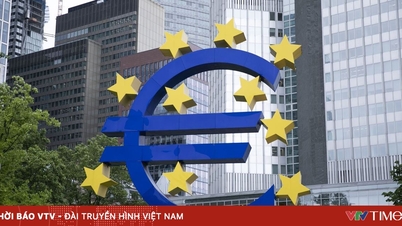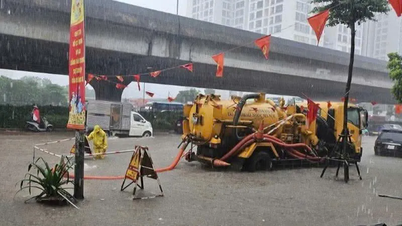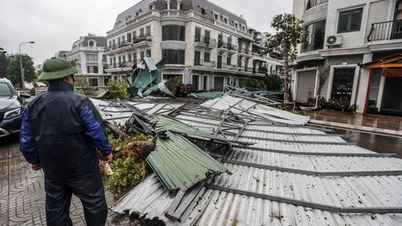Low credit growth, unsold capital
According to the State Bank of Vietnam (SBV), as of the end of May 2023, credit increased by 3.17% compared to the end of 2022, despite the sharp reduction in interest rates. This is a low figure compared to the credit growth target of 14-15% for the whole year of 2023. Deputy Governor Pham Thanh Ha cited the reason as the weak capital absorption capacity of the economy .
In 3 months, the State Bank has reduced the operating interest rate 3 times, with a total reduction of about 100 percentage points (rediscount interest rate from 4.5%/year to 3.5%/year...). The ceiling interest rate for deposits with terms of 1 month to less than 6 months has decreased from 6% to 5%/year. Interest rates on personal savings deposits at banks have decreased sharply. Thereby, lending interest rates have also decreased.
Low credit growth may not be difficult to understand when many businesses signal that they will not expand production, or even shrink. Manufacturing businesses face difficulties in selling their products due to lack of orders. Small and medium-sized businesses are financially weakened and do not have a viable business plan. Real estate businesses face legal difficulties and have few new projects to implement.
It can be seen that businesses are facing difficulties in sales activities, from real estate businesses, retail businesses to seafood and garment exporting businesses...
Vietnam’s manufacturing Purchasing Managers’ Index (PMI) fell to 45.3 points in May due to a sharp decline in new orders. This figure, according to economist Dr. Nguyen Tri Hieu, is too low, reflecting that the economy is in a difficult and stagnant period.
Many real estate companies have temporarily suspended unfinished projects and are not developing new ones. Manufacturing companies have not yet considered expanding their scale.
The retreat in the face of difficulties can be clearly seen in even the potential giants such as Hoa Phat Group (HPG), chaired by billionaire Tran Dinh Long. At the 2023 Annual General Meeting, Mr. Long said that HPG will temporarily put aside its ambitions in the real estate sector and some other sectors, although it is still determined to have a multi-sector business strategy and the goal of being in the Top 3 leading companies in the domestic real estate sector. HPG's real estate sector has had quite good business results over the past many years, bringing in hundreds of billions of dong in after-tax profits each year.
Some real estate and manufacturing businesses have set their business plans much lower.
Economist Nguyen Tri Hieu said that recently there have been many solutions but they have not been successful. For example, reducing interest rates is to reduce capital costs for businesses. But lending interest rates are still high. Banks do not lend much to small and medium enterprises. Lowering interest rates like this is not effective. Reducing VAT by 2% is still not enough.
The financial situation of many businesses is weak and there is no collateral.
The same goes for the 120,000 billion VND social housing loan package. The interest rate is 1.5-2% lower than the normal interest rate in the first 5 years, and then the interest rate is negotiated. Banks voluntarily participate in providing capital, but the problem is the lack of projects to disburse.

On the banking side, credit institutions must also control to ensure financial safety.OCB Bank said it has been proactive and made the most of the policies of the Government and the State Bank in recent times, specifically the policy of debt restructuring, debt extension and deferment for customers.
But in reality, this debt restructuring is different from the Covid period. Specifically, this implementation is not uniform, when restructuring, banks must consider these debts as bad debts to better control and manage debt, and must also increase risk provisions.
The debt restructuring policy is of great significance, as businesses will be able to extend their debt repayment period, reducing pressure during difficult times like the present. OCB has implemented a review and consideration of debt restructuring for about 112 customers, with outstanding debt of nearly 1,000 billion VND.
Many experts admit that many businesses are stuck in business plans due to rising production costs and low demand.
Associate Professor Dr. Dang Ngoc Duc (Institute of Banking and Finance, Hanoi National Economics University) said that the current major problem of the economy is institutions.
According to Mr. Duc, the capital market economy operates according to market rules and under the macro-regulation of the State. Macro-regulation needs to be based on legal and institutional foundations. This factor is important in motivating or hindering development.
In the second quarter of 2021, the economy was assessed to have recovered and grown the fastest in the world. However, at this time, businesses are facing difficulties due to many factors, both objective and subjective.
Even the amount of money from the State budget to support businesses is difficult to disburse. Many businesses are afraid to receive support. Meanwhile, commercial banks are also very cautious when acting as intermediaries in disbursing funds.
According to the State Bank, the amount of 2%/year interest rate support from the State budget with 40,000 billion VND (according to Decree 31) is expected to only reach about 2,570 billion VND until the end of 2023. The main reason why customers refuse to receive interest rate support is due to the fear of being inspected and examined by the authorities later.
This is considered the reason why money is in commercial banks.
How to put money where it needs to be?
Talking to VietNamNet, Economic Expert - Associate Professor - Dr. Dinh Trong Thinh said that whether capital flows into production and business or not depends first of all on whether enterprises want to borrow or not. If they borrow, do they have collateral that meets the conditions of commercial banks?
This speaks to the health of the business because once there are no orders, they do not know what to do with the borrowed money.
“Regarding output, businesses are currently lacking orders because foreign partners are not placing orders. Furthermore, businesses also need to investigate the domestic consumption situation before deciding to borrow capital to expand production and business,” said Associate Professor, Dr. Dinh Trong Thinh.
If a business borrows capital, they must meet all the loan conditions, the most important of which are collateral, no bad debt, etc., then they can borrow.
Associate Professor, Dr. Dinh Trong Thinh said that the State Bank of Vietnam has recently operated monetary policy proactively, flexibly, and positively. He himself once proposed to the State Bank of Vietnam to reduce deposit interest rates, thereby reducing lending interest rates.
“Reducing interest rates over time is appropriate, but being cautious with real estate and stocks is necessary to avoid creating bubbles that are harmful to the national economy.
“Of course, this will also cause some real estate businesses to complain. But this move is also to ensure the safety of the real estate market as well as the financial and monetary market.”
According to banking expert - Dr. Nguyen Tri Hieu, lending interest rates need to be reduced to provide real support to businesses. VAT is the same, in a time when businesses are weak like now, it needs to be reduced further, to 5% and solutions must be found to help businesses borrow money.
Regarding public investment, the Government needs to further promote the disbursement of funds. Bidding activities must be public to be effective. The Government must encourage relevant parties to work more quickly, avoiding the fear of responsibility as the National Assembly has pointed out.
Ms. Tran Thi Khanh Hien, Director of Analysis Department, VNDirect Securities Company, the best solution in this situation is probably to promote public investment and speed up the completion of the land law.
According to Mr. Dang Ngoc Duc, the main problem lies in the institutions. To overcome the difficult institutional situation, there needs to be some urgent solutions in the short term. That is, it is necessary to clearly clarify the cases of financial and business violations in the past and specific handling directions so that enterprises and commercial banks are not "afraid of making mistakes".
Second, it is necessary to clarify and specify the standards for enterprises' access to state budget capital and the regulations allowing disbursement by commercial banks.
One important thing, according to Mr. Duc, is to carefully consider the benefits and costs in handling cases, so as to "hit the mouse without breaking the vase".
It is necessary to review the violations that have occurred based on an objective assessment of the causes from the stages of promulgation of regulations and management. From there, there will be a way to handle them in order to gradually regain the trust of businesses and investors in the economy.
In addition, Mr. Duc said that it is necessary to urgently build incentive mechanisms, creating conditions for businesses to increase production, export and promote domestic consumption: through tax policies, incentives on capital, gasoline and electricity prices, interest rate reduction...
Dr. Hieu said that the stock market has recently increased a few points, but has not yet recovered strongly. He has not seen clearly money going into stocks and bonds. Meanwhile, the real estate market is still very quiet.
And if money flows into stocks and then into businesses in the primary market, it is a good thing. But if money circulates only in the secondary market, it is not good for promoting the economy.
Mr. Vicente Nguyen, Chief Investment Officer (CIO) of AFC Vietnam Fund: The positive impact of the solution of lowering interest rates and reducing VAT is still small, but he also believes that the impact is not much. It is necessary to continue lowering interest rates, extending debt, reducing taxes, extending taxes, lowering lending standards, and especially promoting maximum public investment. Masan Group representative: Lower bank interest rates help reduce businesses' interest expenses, but disbursed credit from banks this year may not be large. Businesses hope that in the second half of 2023, there will be policies to reduce interest rates more deeply, reduce taxes, and promote public investment. |

Source



![[Photo] General Secretary To Lam attends the 8th Congress of the Central Public Security Party Committee](https://vphoto.vietnam.vn/thumb/1200x675/vietnam/resource/IMAGE/2025/10/4/79fadf490f674dc483794f2d955f6045)
![[Photo] Solemn opening of the 8th Congress of the Central Public Security Party Committee, term 2025-2030](https://vphoto.vietnam.vn/thumb/1200x675/vietnam/resource/IMAGE/2025/10/4/f3b00fb779f44979809441a4dac5c7df)
![[Photo] Bustling Mid-Autumn Festival at the Museum of Ethnology](https://vphoto.vietnam.vn/thumb/1200x675/vietnam/resource/IMAGE/2025/10/4/da8d5927734d4ca58e3eced14bc435a3)























































![[VIDEO] Summary of Petrovietnam's 50th Anniversary Ceremony](https://vphoto.vietnam.vn/thumb/402x226/vietnam/resource/IMAGE/2025/10/4/abe133bdb8114793a16d4fe3e5bd0f12)

![[VIDEO] GENERAL SECRETARY TO LAM AWARDS PETROVIETNAM 8 GOLDEN WORDS: "PIONEER - EXCELLENT - SUSTAINABLE - GLOBAL"](https://vphoto.vietnam.vn/thumb/402x226/vietnam/resource/IMAGE/2025/7/23/c2fdb48863e846cfa9fb8e6ea9cf44e7)




































Comment (0)